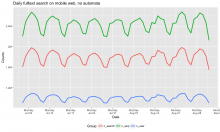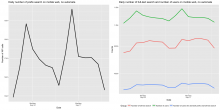Normally the number of search has the same weekly pattern as the number of pageviews, varied by platform. For example, on desktop, the number of search and the number of pageviews are higher on weekdays and drop on weekends.
For mobile web, the pattern of pageviews are the opposite -- higher on the weekends, but we didn't see the same pattern for full-text search:
The query I used is P5973.
This is a spin-off of T174396#3589647.

